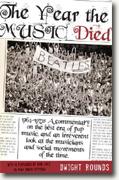The Year the Music Died, 1964-1972
Dwight Rounds
book reviews:
· general fiction
· chick lit/romance
· sci-fi/fantasy
· graphic novels
· nonfiction
· audio books
· author interviews
· children's books @
curledupkids.com
· DVD reviews @
curledupdvd.com
newsletter
win books
buy online
links
home
for authors
& publishers
for reviewers

 |
The Year the Music Died, 1964-1972: A Commentary on the Best Era of Pop Music, and an Irreverent Look at the Musicians and Social Movements of the Time Dwight Rounds Bridgeway Paperback 340 pages July 2007 |
|
In his book subtitled "1964-1972: A commentary on the best era of pop music and an irreverent look at the musicians and social movements of the time," Dwight Rounds admits that he first noticed music when The Beatles hit the U.S. and that he listens to no music post-1972. He sets the parameters upfront.
Rounds is a bean counter who really, really likes The Beatles. There is an entire chapter on The Beatles and another just on John Lennon. Rounds makes it very clear that from 1964 to 1972, no other artists approached The Beatles as musicians, and no music after 1972 is worth mentioning. His "irreverent look" at the role of music in the drug culture and anti-war movement is naive. George Harrison is quoted saying, in 1967, "If you are really hip, you don't get involved with LSD." Right, and The Beatles scoffed at Lucy in the Sky with Diamonds having anything to do with the drug. The most annoying statistics are Round's actuary charts for rock musicians. He develops these to answer whether the '64-'72 rock artists' "supposed heavy use of drugs shortened their life span." Supposed? Dwight, where have you been? I imagine that in 20 years, he'll be living with 40 cats. Originally published on Curled Up With A Good Book at www.curledup.com. © Midge Bork, 2007 |
|
|
|
 Click here to learn more about this month's sponsor! |
|
| fiction · sf/f · comic books · nonfiction · audio newsletter · free book contest · buy books online review index · links · · authors & publishers reviewers |
|
| site by ELBO Computing Resources, Inc. | |
 There's not a lot to read in this book, but there are quizzes and photos and lots, lots, lots of charts. The charts use Recording Industry of America (RIAA) designations by sales (gold, platinum, platinum with a number). Billboard data provides top position reached for both singles and albums, also rank by calendar year. Singles information is only for the year released and covers the Top 40 for the year. Album ranking is by chart position and number of weeks on the chart through 1971. Billboard's single all-time ranking is through 2000. Group all-time ranking is for sales of singles through June 30, 2001. Album all-time sales is from RIAA, so these show long-term trends for albums with staying power. Then there is the song's rank on the Rolling Stone magazine list of Top 500 as of November 2004. These charts are complicated and, for a number of artists, they are all you get - no text.
There's not a lot to read in this book, but there are quizzes and photos and lots, lots, lots of charts. The charts use Recording Industry of America (RIAA) designations by sales (gold, platinum, platinum with a number). Billboard data provides top position reached for both singles and albums, also rank by calendar year. Singles information is only for the year released and covers the Top 40 for the year. Album ranking is by chart position and number of weeks on the chart through 1971. Billboard's single all-time ranking is through 2000. Group all-time ranking is for sales of singles through June 30, 2001. Album all-time sales is from RIAA, so these show long-term trends for albums with staying power. Then there is the song's rank on the Rolling Stone magazine list of Top 500 as of November 2004. These charts are complicated and, for a number of artists, they are all you get - no text.